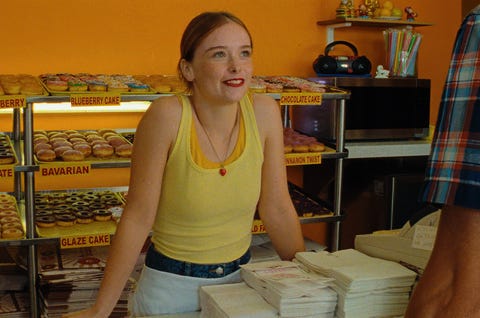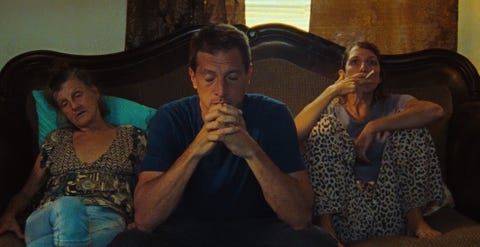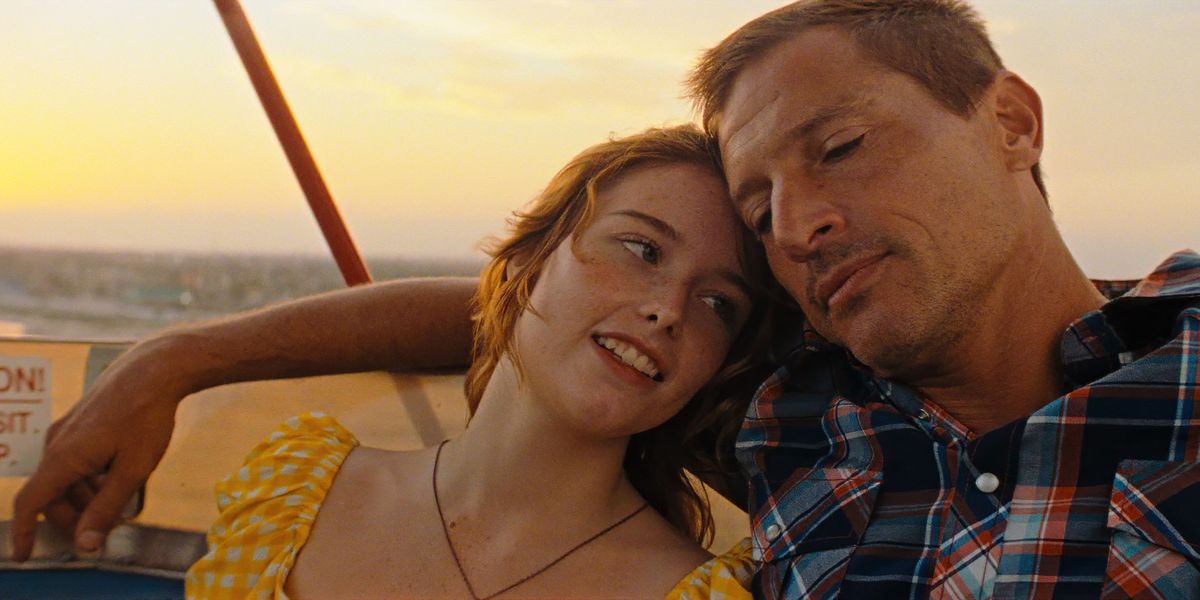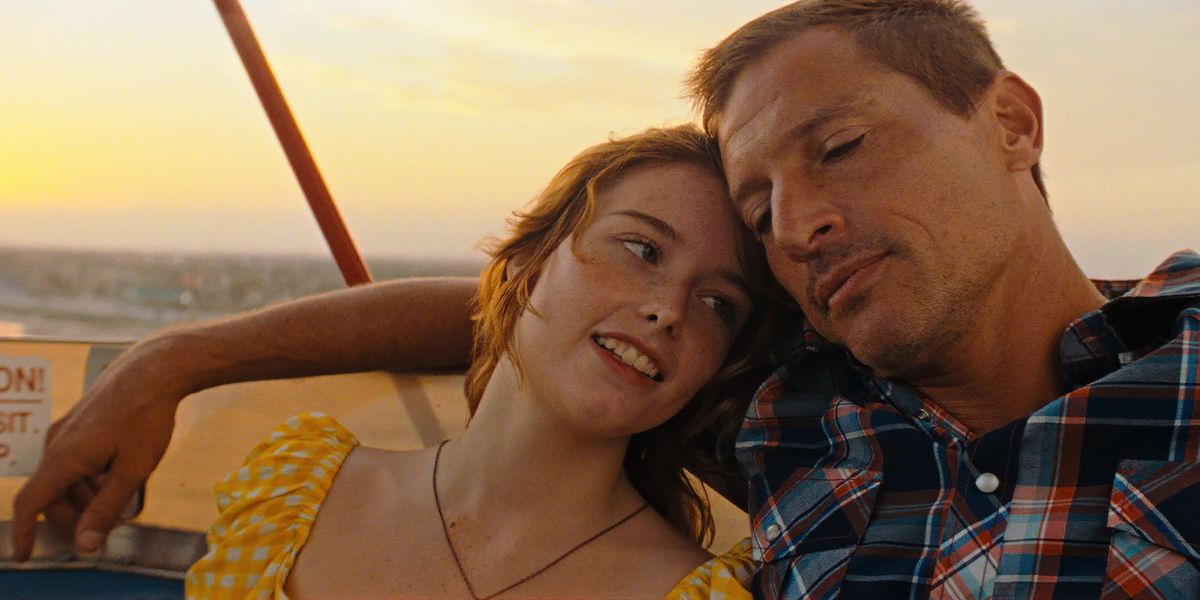Director Sean Baker knows how to make an entrance—and a quick getaway. When we first see Mikey Saber, the ex-porn star protagonist of Baker’s new film, Red Rocket, he’s asleep on a budget bus back to his hometown as NSYNC’s “Bye Bye Bye”plays. You hear the song echoed several times in the film, including while Mikey’s (played by the former MTV VJ Simon Rex) dick is swinging through the Texas night air as he sprints away from trouble closing in.
Rocket follows a down-on-his-luck-but-never-out Mikey as he attempts to hustle his way into the lives of his estranged wife, Lexi and her mother, Lil. Set against the oil fields of Texas City, Mikey becomes infatuated with a young woman, Strawberry (played with nuance and heft by newcomer Suzanna Son), who works at a local donut shop. That’s what the film’s about, but, as with Baker’s other films, it’s not really what it’s about.
The film is also Baker’s follow-up to his critically acclaimed films The Florida Project (2017) and Tangerine (2015), which heralded his arrival one of the most interesting directors working today. He spoke with ELLE.com about his love of antiheros, using his films to chip away at the stigmas around sex work, and making films set in the “shadows” of massive corporations.
This content is imported from YouTube. You may be able to find the same content in another format, or you may be able to find more information, at their web site.
I want to start at the beginning with the opening scene, which is one of my favorites in recent memory due in no small part to NSYNC’s “Bye Bye Bye.” What did you want to communicate with that song?
It organically became an anthem for our film. I would love to say that this was in the script from the very beginning, but quite honestly, it came about because of Suzanna Son. When I found out that she could sing and she taught piano, and then I think she even may have even expressed that she wanted to perform in the film and she’d be comfortable doing it. And I was like, “Okay, we’re going to put your talent on display.” I wrote this scene and then it was about finding the right song that would contextually fit with the film.
So for the next few days we had this text thread going on with everybody in the crew sharing ideas. It was everything from “Hit The Road Jack” to—I wish I could remember some of the other songs, but every song that had to do with ending a relationship or dumping or getting rid somebody. And then it was like, Well, why not just go with the most iconic? I think we were a little skittish to do it because obviously there was going to be a big price tag on that thing. But we just said, “You know what? It’s too good. It’s too good to pass up.”
Lyrically it fits so well, with the boy band stuff, the fact that it came out early 2000 when probably Mikey and Lexi, when she was in her late teens, he was in his early 20s, were heading off to L.A. together. It might even have been their song. And on top of that, it’s just such an iconic song that it’s one of those songs that we know, even if we didn’t own the CD or listen to it all the time, we’ve been exposed to in elevators and in restaurants and it’s part of our culture. It’s an iconic pop song. So it was almost like casting an A-lister in my film.
It also wasn’t even part of the original budget. But, hey, NSYNC read the script, all five members had to sign off on it, and they did.
 Suzanna Son as Strawberry.
Suzanna Son as Strawberry.
Courtesy of A24 Films
I’m glad you brought up Suzanna. The film is being well praised for your casting choices, not just with Simon Rex, but with Suzanna, Bree [Eldrod, who plays Lexi], and Brenda [Deiss, who plays Lil]. Do you think there’s a through line with the female characters around Mikey? What’s your philosophy about using actors who might not be immediately recognizable to a wide audience?
I know that in a business sense, it makes things a lot riskier. It makes things less appealing to general audiences, which is an unfortunate thing. However, I also am trying to make the film that I will forever be okay with, where I’ll be able to sleep at night.
I appreciate the directors who pack their films full of A-listers, but that’s definitely not me. I like to see fresh faces. I like that suspension of disbelief to kick in even faster. When I see somebody I don’t recognize, it really helps with that. Spike Lee is a major inspiration for me, because even though he did use A-listers throughout his entire career, he would always surround them with fresh space and introduce a lot of people into the talent pool, which I think is really important. I remember seeing Samuel L. Jackson, for the first time in Jungle Fever and just being like, “Who is this guy? I want to watch him forever.” I can go on and on about my cast because I love them so much.
I want to ask about the way sex work is portrayed in your films. During the pandemic, with the narrative around people out of work joining OnlyFans, it really brought conversations about normalizing sex work to the forefront. I also think back to the renewed scrutiny during the 2020 election of Vice President Kamala Harris’ record prosecuting Backpage; obviously SESTA-FOSTA is still criminalizing sex workers. What did you want to add to the conversation around sex work with this film?
Everything you just mentioned, plus the Stormy Daniels thing and all that, it all comes down to stigma. It’s looking down on sex work. It’s using sex work to negatively project on other people. I’m obviously for the rights of sex workers, I believe sex work is work and sex workers deserve respect and ultimately—and this is my opinion—sex work should be decriminalized because it’s people’s bodies and they should be able to do what they want with their bodies. That’s the ultimate goal, but I don’t want to preach. I’m already speaking pretty much to an echo chamber when I make these movies.
“I’m trying to make the film that I will forever be okay with, where I’ll be able to sleep at night.”
I’ve also tried to tell stories that are universal, that aren’t preaching, but explore the subject in a different way than a more general audience has seen before, because again, lots of negative representation, even if it’s done in sometimes a subconscious way by the industry, they just portray it in a negative way because that’s how we’ve seen it growing up. Especially now, becoming more of a puritanical country, that seems to continue. So it’s really about using these films to chip away at the stigma. Slowly chipping away, one film at a time, telling stories that humanize sex workers and that hopefully allow audiences to empathize with sex workers.
You said at a press conference at Cannes that you were bracing for backlash, particularly to the movie’s ending. Mikey is a bad guy who does bad things, but he’s also very much a product of his environment—namely economic precarity—like so many of your other characters. That feels like a sentiment that could be controversial, basically that people are more complicated than good vs. evil, red state vs. blue state, and that they’re worthy of a more nuanced view. How has navigating that gray area become part of how you view your work?
As you just said, that gray area, that moral gray, exploring that moral gray. When you’re doing that, it is a navigation, it’s a balancing act. It’s trying to figure out, especially when you’re trying to explore the complexities of a character or of somebody’s psyche, you never know if the balance is on or off, and it’ll be on and off for different people, different audiences will bring their own set of ethics, politics, and viewpoints into it. The balancing act is something in which you tackle during writing, you tackle it again during production—the tone of scenes, the pacing—and then ultimately it’s in post-production that you’re really figuring it out and saying, “I think I struck this balance correctly.” It would’ve been a very easy film to make if it was a black and white morality tale of big, bad wolf, little innocent lamb. I swear to God, I could make that film with a blindfold on.
But that’s not what I’m interested in. And that’s not what I found when I explored the adult film world. I found very complex people with agency and reasons behind why they got into it, all different reasons. We had consultants on the film that were really adamant about this. They wanted Strawberry to be complex. They wanted Brie to be complex. And I definitely wanted to represent them in a way that my consultants would be happy about as well.
 Brenda Deiss, Rex, and Bree Elrod.
Brenda Deiss, Rex, and Bree Elrod.
Courtesy of A24
Why do you feel drawn to complicated characters like Mikey?
It’s about that antihero thing that I think we’re seeing less and less in film and TV. I think it’s because we’re just in a puritanical time in which everybody has a soapbox because of social media, so if somebody’s sensitive to something, they don’t want to see it, they let the world know they don’t want to see it. Then corporations are like, This group doesn’t want to see that. Let’s stop showing it. We’re censoring ourselves in a way, and it is really something that I don’t feel we should be censoring ourselves on. I feel like antiheroes teach us things. We see flaws in human characters like we have flaws in ourselves. I think we can actually connect with characters who have flaws easier than saintly characters. I don’t think we learn much from the pure hero.
They’re also less interesting to watch, in my opinion.
Exactly. They’re less interesting. I also really love behavioral humor like Curb Your Enthusiasm, just interactions between human beings, and when interactions are a little aggressive, that can be fun to watch. I think we’ve forgotten that that can actually be entertaining without making fun of people. It’s not making fun of people. It might sometimes be poking, or it’s just seeing the humor in our lives, because our lives, even if we have hardships in our lives, it doesn’t lack humor. We use humor to cope. Our personal lives are a balance between comedy and pathos. So if the characters don’t show that as well, I don’t think I’m making a truthful film. I don’t feel I’m being honest.
Like with Tangerine and Florida Project, Red Rocket is set in post-industrial America. How do you see those places as essential to shaping your characters?
Specifically about Red Rocket, the oil and gas industry is a controversial industry. It obviously is having effects globally on our climate, but we also have to recognize that it’s people’s livelihoods and it’s an important industry for the U.S. So there’s that conflict—also just on a visual sense as a director, to shoot in Texas City, I could literally spin the camera to any direction and get an incredible landscape with this twisted metal and steam and smoke and flames. It’s almost apocalyptic.
“Antiheroes teach us things. We see flaws in human characters like we have flaws in ourselves.”
Like with Florida Project, I was trying to show that there are people who literally live in the shadows of these corporation, people who are that close in proximity to something that’s keeping them alive or killing them at the same time. It’s different with every film. Obviously with Florida Project, it had to be Kissimmee, Orlando, because that’s where, if children were living outside of Walt Disney World in extended stay motels, they would be.
But in this case, it could have been any refinery town. It’s just that I fell in love with Texas City. We explored the Gulf Coast, we drove south, went to Corpus Christi, drove north, but really fell in love with Texas City and understanding the history of the surrounding area added a lot, because another theme that we were tackling was history, the long, dark history between Mikey and Lexi. Then discovering Texas City had that explosion in 1947 that killed 581 people, and the chemical spill in the late ’80s, and Galveston that had the terrible hurricane in 1900 that killed 12,000 people. And the Texas killing fields and Juneteenth and the slave trade, that whole area has, in my eyes, sort of a dark cloud of history on top of it. That was like the thing that sealed the deal for me. I’m like, we have to shoot this film here.
Red Rocket is in theaters now.
This content is created and maintained by a third party, and imported onto this page to help users provide their email addresses. You may be able to find more information about this and similar content at piano.io

































